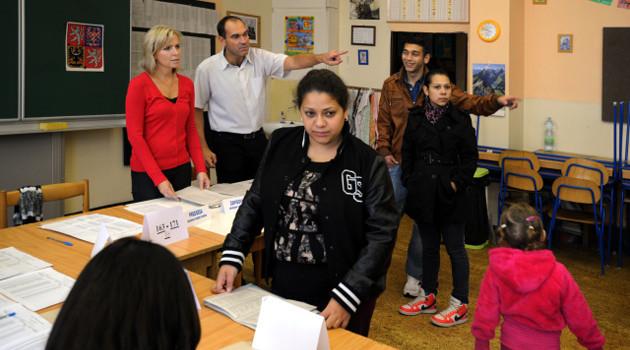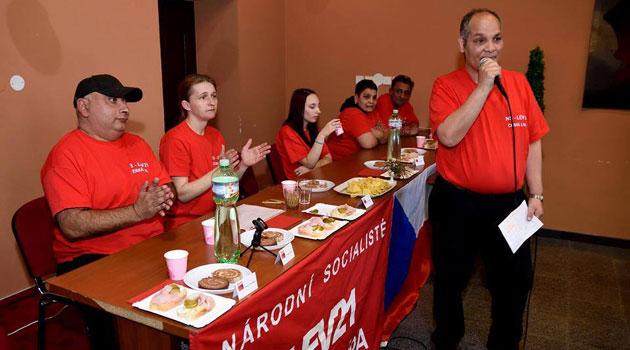Commentary: Czech Regional and Senate elections - Roma didn't vote, Romani candidates didn't win

The outcome of this weekend’s elections to regional assemblies and to one-third of the Czech Senate in localities where a greater number of Romani people live did not demonstrate any significant voter preferences – rather, what was typical of those localities was a very low voter turnout. Romani candidates were not elected anywhere.
The Roma Democratic Party (RDS) won just 480 votes in the entire country. Of the Romani candiates who were running as candidates on the lists of other parties, the most successful candidate was Karel Karika (Greens/Pirates), but he did not win a seat on the regional assembly.
Low voter turnout in Romani localities
If we have complained during the previous elections that Romani people don’t vote, that complaint applies doubly to the elections that have just ended. During the 2014 local elections at the Chanov housing estate, for example, just 132 pople voted.
In the regional and Senate elections that have just ended, just 27 voters at Chanov cast a ballot for the regional assemblies and a mere nine people cast a ballot for their preferred Senator. If we take into consideration that more than 800 people are registered to vote there, then statistically voter participation was zero.
There is probably no point in reporting on whom those voters chose, but the information is: The Communist Party of Bohemia and Moravia (KSČM) won the regional vote at Chanov, while most of those who cast a ballot there gave their Senate vote to former hockey player Jiří Šlégr (62.5 %), running for the Czech Social Democratic Party (ČSSD). Further north, in the town of Trmice, where two years ago the Romani group called “Movement Together for Trmice” (Independent Choice) led by Martin Bajger broke through in the local elections, no Romani candidates made it anywhere this time.
First place in the regional contest in Trmice went to the “Mayors and Independents” movement (23.52 %), with the KSČM (19.3 %) in second place. Interestingly, the third-place finish for ANO there was followed by the Workers’ Social Justice Party (DSSS), in fourth place with 8.63 %.
Overall, however, the DSSS failed. Voter turnout in Trmice was 23.84 %.
In the town of Obrnice, where approximately 40 % of the population is Romani, the Civic Democratic Party (ODS) won with almost 30 % of the votes. In actual numbers that means just 89 votes cast for the party.
Voter turnout in Obrnice was just 18.64 %, which means that out of a total number of 1 658 voters, just 309 cast a ballot. It is a question, therefore, how many Romani residents voted, especially after ODS used an anti-Romani, racist video spot during its campaign.
What is paradoxical about the entire situation is that Drahomíra Miklošová, the mayor of Obrnice who was in second place on the ODS regional candidate list, was recently given an award by the Council of Europe for policies that set a good example on Romani integration. It would be better for her to give that prize back after her party’s racist campaign tactics.
In any event, it seems Romani people in Obrnice did not take advantage of the opportunity to cast more than 650 votes. Over at the Janov housing estate in Litvínov, in precincts where Romani voters are registered, turnout was similar to that in Chanov.
In precinct number 3 at Janov, of 443 potential voters, only 16 people cast a ballot. The KSČM won there with five of those votes.
In precinct number 4 at Janov, out of 525 potential voters, just 24 people cast ballots (ANO was the victor). When we realize that, in the Senate elections, just one thousand votes is the equivalent of anywhere between 4 to 5 % of all ballots cast, we can see that this has actually been a wasted chance for Romani voters to influence the outcome of the Senate elections in particular.
Theoretically, Romani voters could significantly influence those elections in certain locations to make sure that anti-Romani candidates such as Jaroslav Doubrava in the Ústecký Region or Liana Janáčková in Ostrava do not become Senators. However, in order to do that, they must get off the couch, stop cursing politicians on Facebook, and go vote!
RDS fails again
If we were to only ever write about Romani parties after each election, all we would have to do is photocopy the article from the last time around – this year the Roma Democratic Party (RDS) drew up candidate lists just in the regions where it could find 23 candidates to run, 15 in Moravia-Silesia and four each in the Central Bohemian and Liberec Regions. The other “Romani” party in the Czech Republic, the Equal Opportunities Party, did not field candidates this time.
In the Central Bohemian Region, the RDS got a total of 247 votes, or 0.07 %, 80 votes (0.06 %) in Liberec, and 153 votes (0.05 %) in Moravia-Silesia. This represents a decline, since in the 2014 local elections approximately 600 people cast their ballots for the RDS in Ostrava alone.
Romani candidates for other parties
News server Romea.cz estimates that around 20 Romani people ran for office on the candidate lists of the mainstream parties. None have been elected.
The candidate who came closest to winning a seat on a regional assembly was Karel Karika, who ran in the Ústecký Region for the Greens/Pirates coalition in fifth place on the ticket. The coalition got 4.4 % of the vote and will not be seated.
Karika personally received 218 preferential votes, becoming the most successful Romani candidate of these elections. Again, if we realize that according to estimates there are as many as 20 000 Romani people living in that region (naturally, not all of whom can vote), then Karika could have made it onto the regional assembly if Romani votes had been cast.
Romani people did not vote in that region this time around, so no Romani regional assembly member will represent them there. In Liberec Region, where as many as seven Romani people ran for the regional assembly, the candidate list of the National Socialists-LEV21 lost overwhelmingly.
However, it is a good thing the party failed, because in the Ústecký Region it is precisely the LEV21 party that has joined forces with the anti-Romani DSSS. In the Liberec Region, LEV21 won just 95 votes, or 0.07 % of the vote.
Milan Horvát, who was a candidate in the Central Bohemian Region for ODS, running in 60th place on their list, won 57 preferential votes. Rudolf Polák, running in the Hradec Králové Region in 38th place on the ČSSD candidate list, won 102 preferential votes.
